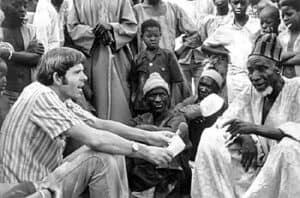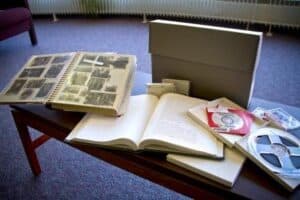Is everything we collect Oral History?
Oral History must be assessed according to its strengths and weaknesses.
Basically, each interview is just a picture of a particular time or event and that is being shared based on the individual memory of a person.
This person is subject to various influences which, in turn, condition his/her view of events in the account.
When we think about what is oral history let us not forget that there are no two people in the world who will remember the same episode the same way.
What is Oral histoy – The importance of the interview
Even people who lived a certain historical moment together will have different visions and memories, based on their personal interests, the attention with which they were to this or that detail, and other details that make up their very own personalities.

In West Africa, tradition is maintained by the Griots, the keepers of stories.
In this image, we can see Tom Hale interviewing the griot Ayouba Tessa (1981, photograph by Thomas A. Hale).
It is also up to the historian to check if he/she is giving voice to the right people for his/her project.
The History that is written in the books is one that was written by historians and not by ordinary people – the anonymous, the excluded.
What is oral history – The historian’s role
So the historian must, before the contacts and sources collected, check if those contacts and sources are of interest because he/she may be excluding an important element to the project.
The collection of oral history information takes place through interviews.
And it is essential that the interviewer is prepared for this moment because the person being interviewed is in itself a historical source.
What is Oral History – The project
An oral history project must be well structured.
It should include the phases of:
– Preparation / research.
– Careful preparation of the interview.
– Collection of information.
– Organization and archiving of information.
– Availability and dissemination of the collected data.